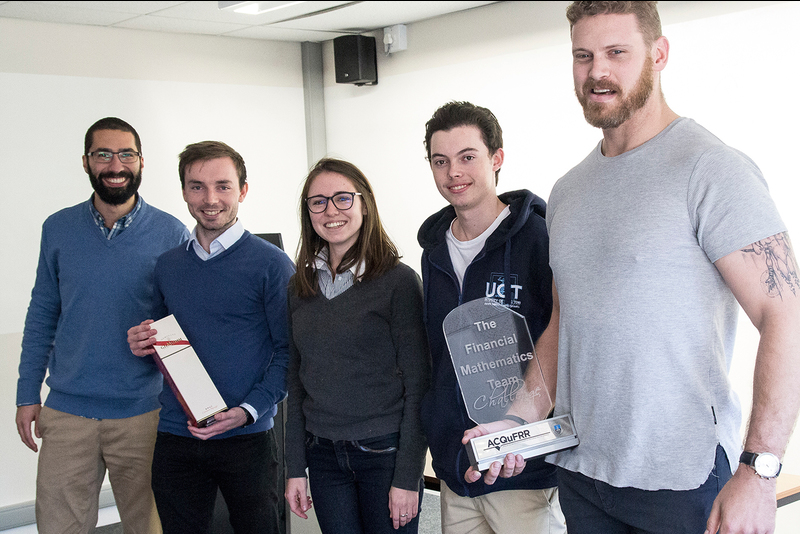UCT-led team wins international maths challenge
01 August 2017 | Story Supplied. Photo Supplied.
The fourth annual Financial Mathematics Team Challenge (FMTC) brought students from across the world to the University of Cape Town (UCT) to participate in an event that has become a highlight of the academic financial mathematics calendar.
A UCT-led team won the prestigious event, which attracted top students and academics from Europe, South America, the UK and Canada. The competition saw them divided into teams, presented with problems and judged on their solutions at the end of July 2017.
The winning team, led by PhD student Ralph Rudd from UCT and mentored by Adjunct Professor Rodrigo Targino from the Fundação Getulio Vargas (FGV) institution in Brazil, was announced at the end of an intense 10 days of work on real-world financial modelling problems.
“Apart from students and academics getting to know each other and collaborating on financial mathematics problems, the challenge also prepares students for corporate scenarios they will encounter in industry once they enter the business world,” said Professor David Taylor, who heads up the African Institute of Financial Markets and Risk Management (AIFMRM) and the African Collaboration for Quantitative Finance and Risk Research (ACQuFRR) in the Faculty of Commerce at UCT. The maths challenge is jointly hosted by ACQuFRR and University College London (UCL).
The 2017 winning team came up with a solution on risk parity, with a real-life application for investment firms building portfolios for investors, in which risk is allocated in a different way and presents investors with new opportunities to offer to their clients.
“The judging was incredibly narrow,” said Rudd. “There was such a high level of competition, but I like to think that what gave us the edge was that our presentation was very polished and solid.”
“Initiatives like the challenge ... allow students and prospective professionals to flex their mathematical and financial muscles.”
Challenge mimics real life
Professor Taylor said that the challenge mimics the environment that industry professionals face every day.
“One of the things we have noticed over the past two years is that employers are starting to look for employees who have participated in the team challenge,” he said. “The kind of environment the challenge mimics is close to real life, where there is also often not a lot of time to solve difficult problems.”
In addition to UCT, the 2017 FMTC attracted students and mentors in financial and insurance mathematics from University College London, the University of Technology Sydney, ETH Zürich, the University of Vienna, McMaster University and the Universidade Federal do Rio de Janeiro.
Glen Point Capital LLP, a London-based hedge fund, contributed one of the research problems as well as partial sponsorship of the 2017 challenge.
The atmosphere during the challenge is tense and teams are encouraged to focus on their problem with as little distraction as possible. The amount of work each team does is equivalent to a master’s dissertation and many of the challenges have gone on to inspire research publications.
In this sense, it ties in closely with the mission of ACQuFRR, which is to advance the theory and application of modern, quantitative, statistical and mathematical techniques to the modelling and risk management of financial products and markets.
“The world is becoming more and more mathematical,” said Professor Taylor. “Initiatives like the challenge not only help to develop links with international postgraduate students and academics in the field, but also allow students and prospective professionals to flex their mathematical and financial muscles.”
 This work is licensed under a Creative Commons Attribution-NoDerivatives 4.0 International License.
This work is licensed under a Creative Commons Attribution-NoDerivatives 4.0 International License.
Please view the republishing articles page for more information.










